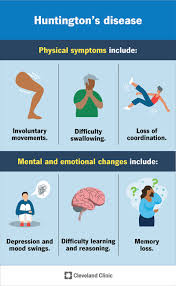Exploring Huntington Disease: Symptoms, Causes, and Research

Introduction
Huntington disease (HD) is a hereditary, degenerative brain disorder that leads to the progressive breakdown of nerve cells in the brain. The disease has profound implications not only for those affected but also for their families and communities. As one of the most well-known genetic disorders, understanding Huntington disease is crucial as it relates to advancements in research, therapeutic options, and overall awareness around genetic conditions.
Understanding Huntington Disease
Huntington disease is caused by a mutation in the HTT gene located on chromosome 4, which leads to the production of an abnormal protein that gradually destroys cells in specific areas of the brain, particularly the basal ganglia. Symptoms typically begin between the ages of 30 and 50 and can include movement disorders, cognitive decline, and psychiatric conditions. Common early symptoms involve unintentional movements, difficulty in swallowing, and changes in mood or behavior.
Recent Developments and Research
Recent advancements in genetic research have provided hope for individuals and families dealing with HD. Ongoing clinical trials are exploring various therapeutic strategies aimed at slowing the progression of the disease. Companies like Wave Life Sciences and Novartis are exploring gene-silencing technologies, which could reduce the production of the harmful protein associated with Huntington’s symptoms. Furthermore, researchers are looking into the potential benefits of lifestyle modifications, including diet and physical activity, which may help to manage symptoms and improve the overall quality of life for patients.
Conclusion
Understanding Huntington disease is essential in fostering awareness and encouraging further research. With approximately 1 in every 10,000 people affected globally, the importance of education, support for those diagnosed, and ongoing research cannot be overstated. As science continues to unravel the complexities of this condition, prospects for more effective treatments and possible cures are beginning to emerge. For families impacted by Huntington disease, the future may hold new hope as they navigate their path through this challenging diagnosis.








